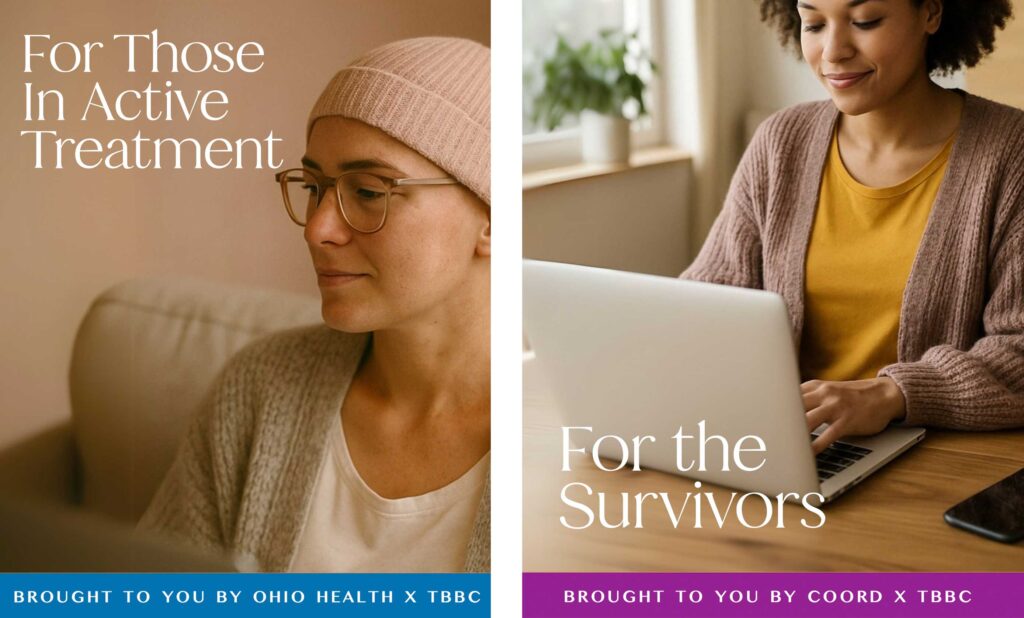Resources & Supportive Insights Vital To Our Experiences
A breast cancer diagnosis can feel like the ground beneath you has disappeared. The life you were building suddenly takes a backseat. For younger women, this can be especially overwhelming — right when you were preparing to take the next big steps in life, you’re now navigating complex medical decisions, financial concerns and a wave of new emotions.
But you are not alone.
Others have walked this path before, and we are here to share what helped us. There is strength in knowing that support exists and that you don’t have to face this journey without guidance.
Mental Health & Positive Health Outcomes
Your mental health plays an essential role in your recovery. Research has shown that emotional well-being can profoundly influence physical healing, energy levels and even treatment outcomes. Prioritizing your mental health isn’t just about feeling better — it’s about giving yourself the best possible foundation for healing.
Use Gratitude To Connect & Reconnect With Your Support Pillars
One of the most impactful things you can do is lean on those who have been your support system up to this point in your life. Who helped you through finals in college? Who was the first to know you were engaged? Who showed you the ropes at your first career job?
If you feel comfortable, reach out to friends, family members or mentors who have guided you in other difficult moments. Your community — no matter how big or small — can be an anchor during this time. They will be grateful knowing they made an impact on your life and that you trust them still today.
Assistance From A Therapist That Specializes In Cancer Journeys
Cancer changes your world in ways that are difficult to process on your own. Speaking with a therapist who understands the emotional toll of cancer can make a significant difference in how you move forward. However, finding a therapist with experience in oncology can be challenging — we experienced this first time.
If you already have a therapist, ask if they have worked with cancer patients before. If not, they may be able to refer you to someone who has. In addition, online communities and peer support groups can provide supplemental guidance, offering understanding and encouragement from others who truly “get it.”
Thriving Beyond Breast Cancer’s Mental Health Resources
We believe that no one should have to navigate breast cancer alone. That’s why Thriving Beyond Breast Cancer offers a free online mental health programs for those in active treatment, and survivors.

Our support groups are designed specifically for young women facing breast cancer and the aftermath. In these groups, you’ll find emotional support, practical advice and a community of women who understand your experience firsthand. Together, we help each other gain valuable coping skills, reduce feelings of isolation and offer a chance to have your voice heard.
The Heavy Burden of Healthcare Costs
Navigating treatment is hard enough, but the financial strain can make it feel even tougher. The reality of medical bills, insurance complexities and out-of-pocket costs can be overwhelming, especially when your energy is already stretched thin.
Financial literacy and understanding insurance options are crucial, yet so many resources go overlooked. To help make this process easier, we’ve compiled some of the most reliable and comprehensive financial aid resources available.
[Financial Aid for Cancer Patients]
The Thriving Beyond Breast Cancer Stipend Program
We recognize the unique financial challenges that come with a diagnosis. We’ve been there, and we are committed to making sure that no woman has to choose between financial stability and getting the care she needs. Our breast cancer stipend program helps alleviate the financial strain of medical treatments and medication costs, providing young women with real financial support when they need it most.
Striking The Information Ecosystem Balance
The internet can be a powerful tool for finding information and connecting with others. But it can also lead you down rabbit holes filled with conflicting advice, horror stories and misinformation.
“If following survivors on social media helps, do that. If being reminded about it constantly hurts, delete the apps from your phone. There’s no ‘one way’ to support yourself! Use what you know about yourself to balance ‘staying informed’ & ‘staying sane.’”
-Bess Hagans
If Possible, Don’t Go Sedentary
It’s tempting to shut down physically when you’re going through treatment but movement matters. Even light physical activity can help manage fatigue, improve mood and enhance therapeutic outcomes. You don’t need to push yourself too hard — household chores, gentle stretching and knocking out a few work tasks can make a difference. The goal is to keep your body and mind engaged in a way that feels right for you.
Supplements & Nutrition To Support Mental Health
- Magnesium – Regulates stress hormones and promotes relaxation, reducing anxiety and muscle tension.
- Vitamin D – Supports mood stability and immune function; low levels are linked to depression.
- Omega-3 Fatty Acids – Supports brain health, reduces inflammation and improves emotional well-being.
- B Vitamins (Especially B6 & B12) – Essential for energy production and neurotransmitter function, helping with mental clarity and focus.
- Ashwagandha – An adaptogen that may help lower cortisol (the stress hormone) and promote emotional balance.
- Probiotics – Often called ‘the 2nd brain of the body,” the gut is directly tied to mental health, and probiotics can support digestion and mood regulation.
Remember: Self-Care Is Healthcare
Taking care of yourself during treatment is not selfish! This was one of the hardest lessons we had to learn ourselves. Self-care isn’t about indulgence; it’s about finding ways to reduce stress, ease discomfort and maintain a sense of control over your life.
- Gentle Movement: Whether it’s stretching, walking or yoga, light movement can help ease fatigue and improve mood.
- Mindfulness & Meditation: Guided meditation and breathing exercises can help reduce anxiety and promote relaxation.
- Creative Outlets: Writing, cooking, painting or playing music can be therapeutic ways to express emotion and get lost in a different reality.
- Comfort Items: Soft blankets, warm baths, a day trip to the medspa and comfortable clothing can make difficult days feel a little easier.
- Rest Without Guilt: If your body needs rest, listen to it. Sleep and recovery are just as important as treatment.
- Do “The Thing”: That musical you’ve wanted to attend? The fancy restaurant you’ve wanted to try? The Sephora spree? Just do it! You have our endorsement.
About The Author
Bess Hagans is the Chief Executive Officer of Thriving Beyond Breast Cancer and a breast cancer survivor. She understands firsthand the mental, emotional and financial burdens that come with a diagnosis. Through her leadership, she is committed to empowering young women by providing real resources, financial aid and emotional support to help them navigate this journey with strength, resilience and community.
